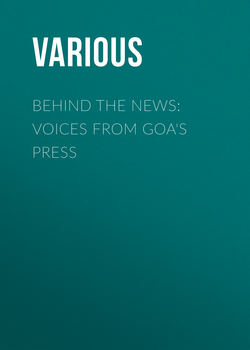Читать книгу Behind the News: Voices from Goa's Press - Various - Страница 4
Chapter 1: Sixties' stories: Free Goa's first elections
Convinced
ОглавлениеBut having persuaded myself willfully with auto-suggestion, and having been on a one-track crusade, I remained convinced that Congress would win the day. On the eve of the election, a day of pause in electioneering, I wrote an upbeat story (about three takes) and handed it to Mr. Salkhade, the news editor from Maharashtra. He scanned the intro and set it in the tray of stories for the front page. Then he looked up and said to me, "You know, Kakodkar is going to be the chief minister of Goa."
It was about 4 p.m. Something in the tone of his voice gave me pause. Then a wild notion entered my head, a spur-of-the-moment impulse, with no rhyme or reason, a mad folly that sometimes seizes lovers at play. I phoned Kakodkar.
"Hello, Purushottam." Although only 28, I was now on first-name basis with him.
"Hello Ben."
"It's a day of rest for you today. Is everything okay?"
"Fine."
"I've just finished writing my lead story for the paper tomorrow. Looks like Congress will win with an overwhelming majority. You must be pleased with the campaign. What do you think?"
"We have to wait and see," he said in a voice devoid of any emotion, but not exhausted. In this respect, Kakodkar came across as cool and circumspect, a man in full control of his emotions.
Mr. Salkhade was busy editing copy at the other end of the newsroom, beyond earshot. That wild notion came rushing again, prompting me to make the pitch, even if it was only hypothetical.
"Purushottam, can I ask you something?"
"Sure, of course."
"You know our paper has been very good to you and the Congress. And I, more than anybody else, have been responsible for all the publicity you've received. Soon you'll become the chief minister of Goa. Now I want to ask you: what will you do for me?"
A pause and, "What do you mean?"
"What I mean is, if you become the chief minister, can I be your press secretary?"
"I can't answer that."
"Why not?"
"I can't do it."
"Listen, I know you're not the chief minister yet. But in the event that you do become the chief minister, could you not at least tell me what your disposition will be?"
"No."
"You know, I can't believe you're saying this. I am not asking you for a job. I already have a job. All I am asking is, if you become the chief minister, what will you do for me? That's all."
"I can't do anything," he said.
"That's the answer I get after all that I have done for you? I am disappointed. Goodbye and good luck tomorrow."
"Thank you," he said and put the phone down first. I pictured him, in his customary white khadi bush shirt and pants, wearing a self-righteous expression on his face.
During this call, over the carriage of my Underwood typewriter, I was watching the news editor for my voice carried unusually far. But he was focused on his work and didn't look up in my direction.
I lit up a cigarette and hunched over the typewriter, dismayed beyond description. I had heard that Kakodkar was a highly principled man, and then with a sinking feeling in my gut, I realized I was being used, a means to the end. I shall never forget that moment.
Then I walked to my favorite bar to nurse my bruised ego.
Three days later, the election results came out. The Congress was wiped out without a single seat in Goa. The MG won 14 seats to the UG's 12, with two independents, plus an independent winning in Diu and a lone Congress victory in Daman.
I kept brooding about Kakodkar. Did he know something that I didn't? Was that why he said he couldn't do anything for me? I had no heart to ask him that. After that personal and private telephone conversation, the two of us carried on as if nothing had happened. And during the next year, my encounters with Kakodkar became strictly professional but cordial.
